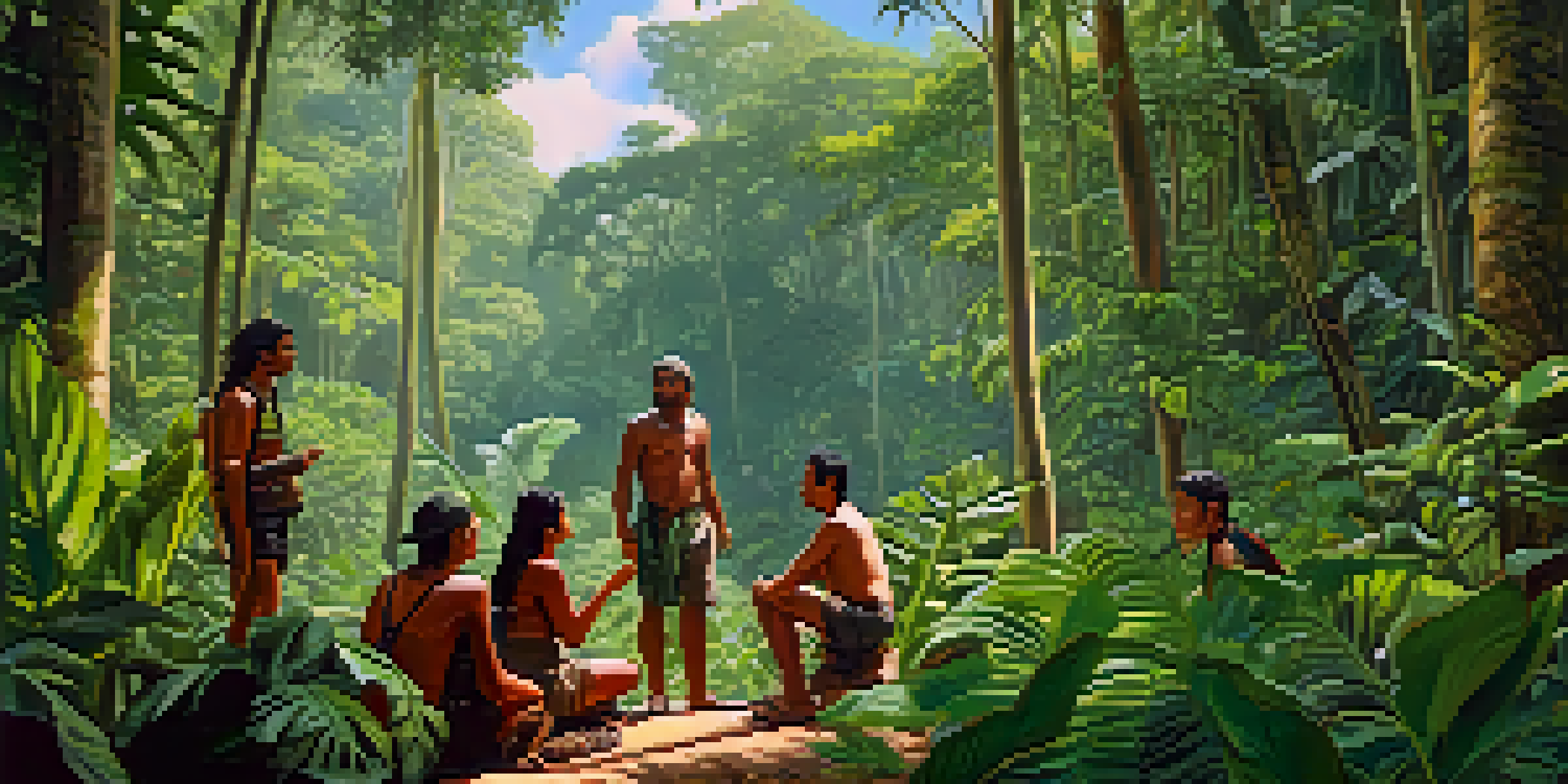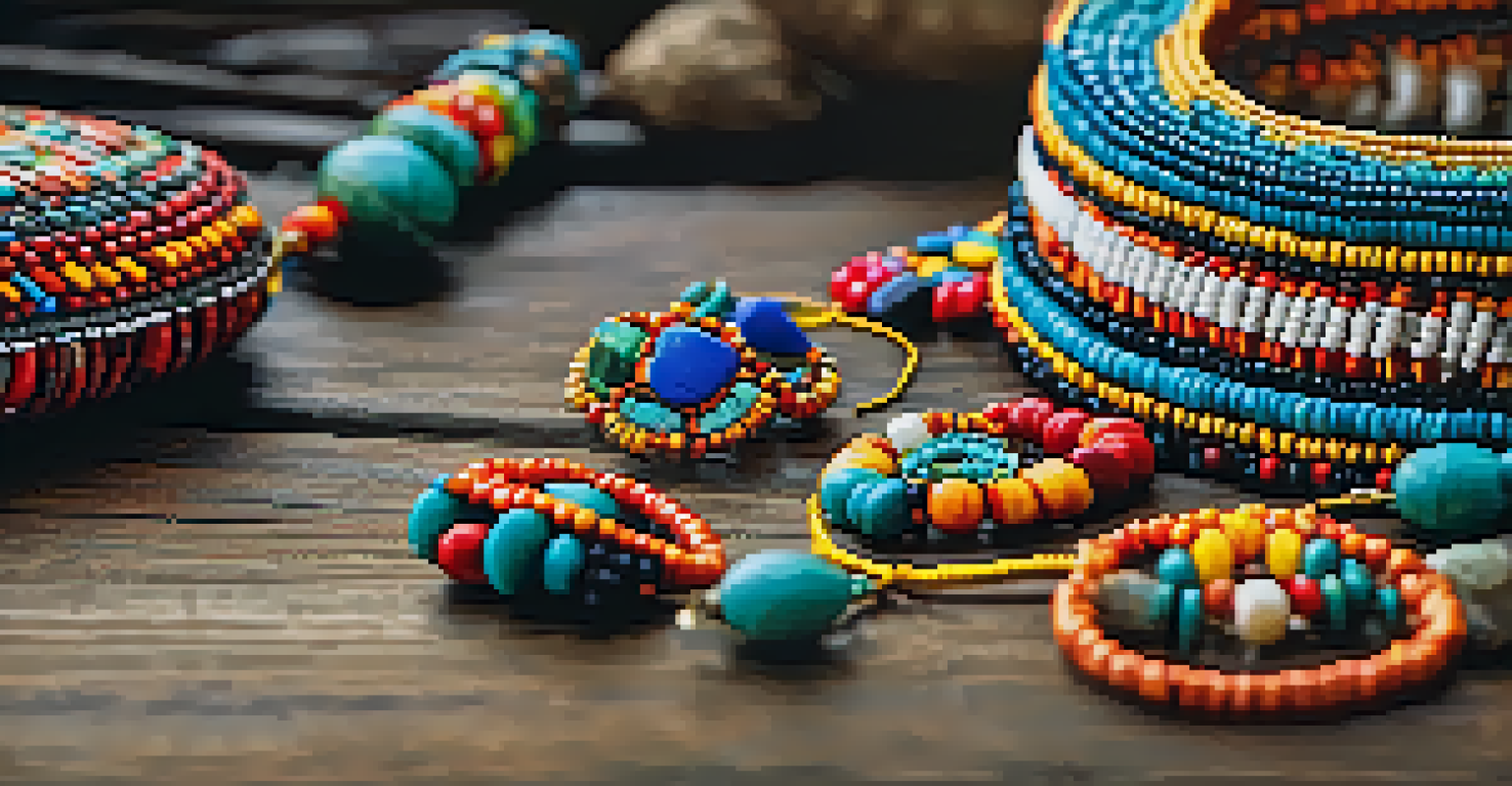The Impact of Indigenous Cultures on Brazil's Historical Tours

Understanding Indigenous Cultures in Brazil's History
Brazil's rich history is deeply intertwined with its Indigenous cultures, which date back thousands of years. These cultures have profoundly influenced the country's social, economic, and spiritual landscapes. From vibrant festivals to traditional arts, Indigenous contributions are visible in many aspects of Brazilian life today.
Indigenous cultures are not relics of the past; they are alive and evolving, guiding us toward a more sustainable future.
When we think of Brazil, images of Carnival and samba might come to mind, but Indigenous communities have their own unique traditions that enrich the national tapestry. Their languages, customs, and beliefs have been passed down through generations, offering a glimpse into a world that existed long before European colonization.
Understanding this historical context is crucial for anyone interested in Brazil’s past. By acknowledging the deep roots of Indigenous cultures, we can appreciate the diverse influences that shape contemporary Brazil, especially when exploring its historical tours.
The Role of Indigenous Knowledge in Historical Tours
Indigenous knowledge plays a fundamental role in the historical tours of Brazil, providing visitors with insights that are often overlooked in traditional narratives. Guides from Indigenous communities share their perspectives, revealing stories and practices that reflect their connection to the land. This adds a layer of authenticity to the experience, encouraging deeper appreciation.

For example, when visiting the Amazon rainforest, a tour led by Indigenous guides can offer unique insights into the medicinal plants and sustainable practices they’ve used for centuries. This knowledge not only enhances the tour but also fosters respect for the environment and its preservation.
Indigenous Cultures Shape Brazil's Identity
Brazil's history is deeply influenced by Indigenous cultures, contributing to its social and spiritual landscapes.
Moreover, these tours empower Indigenous peoples, allowing them to share their heritage and educate visitors. This exchange creates a more inclusive narrative of Brazil, where all voices are acknowledged and valued.
Cultural Heritage Sites and Indigenous Contributions
Brazil is home to numerous cultural heritage sites that highlight Indigenous history, such as the Serra da Capivara National Park, known for its ancient rock paintings. These sites serve as a testament to the creativity and resilience of Indigenous peoples throughout the ages. They invite exploration and reflection on the enduring legacy of these communities.
The preservation of our cultural heritage is vital for the survival of Indigenous peoples and the richness of our global community.
Visiting these sites provides an opportunity not just to learn about history, but to engage with it. Many tours incorporate storytelling, allowing visitors to hear directly from Indigenous people about their ancestors and the significance of these locations.
By recognizing and preserving these cultural heritage sites, Brazil honors its Indigenous populations and their contributions to the nation's identity. This effort fosters a sense of pride and ownership among Indigenous communities, while educating the public about their rich histories.
Challenges Faced by Indigenous Communities Today
Despite their profound impact on Brazil's culture, Indigenous communities face numerous challenges today. Issues such as land rights disputes, deforestation, and cultural assimilation threaten their way of life. These challenges also affect how their histories are presented in tourism, often overshadowing their contributions.
Tour operators and travelers can play a vital role in addressing these challenges by choosing to support tours that are respectful of Indigenous rights and heritage. Engaging with Indigenous-led initiatives not only enhances the travel experience but also contributes to the sustainability of their cultures.
Empowerment Through Indigenous Tours
Historical tours led by Indigenous guides provide authentic insights and empower communities by sharing their heritage.
Raising awareness about these challenges among tourists is crucial. By understanding the struggles Indigenous peoples face, visitors can approach their experiences with empathy and a desire to advocate for change.
The Benefits of Experiencing Indigenous Culture
Experiencing Indigenous culture through historical tours enriches both the traveler and the community. For visitors, it offers a chance to step outside of their own world and gain a deeper understanding of a culture that is often underrepresented. This can lead to transformative experiences that change perceptions and foster respect.
For Indigenous communities, sharing their culture can be empowering. It allows them to reclaim their narratives and educate others, which can help combat stereotypes and misconceptions. This cultural exchange can create lasting relationships between travelers and Indigenous peoples.
Ultimately, these tours provide a platform for dialogue and understanding that benefits everyone involved. They highlight the importance of cultural preservation while promoting tourism that is ethical and inclusive.
Indigenous Crafts as a Reflection of Cultural Identity
Indigenous crafts are not just beautiful artifacts; they are vibrant expressions of cultural identity and history. Items like woven baskets, pottery, and jewelry often carry stories and meanings that reflect the community’s traditions. Tourists who engage with these crafts gain a tangible connection to Indigenous cultures.
Many historical tours include workshops where visitors can learn about these crafts directly from Indigenous artisans. This hands-on experience not only supports local economies but also fosters appreciation for the skills and knowledge that have been passed down through generations.
Importance of Responsible Tourism
Engaging in responsible tourism ensures that travelers support Indigenous rights and cultural preservation.
By purchasing authentic Indigenous crafts, travelers contribute to the preservation of these cultural practices. This creates a positive cycle that supports artisans and encourages the continuation of their traditions for years to come.
Responsible Tourism and Indigenous Communities
Responsible tourism is essential when engaging with Indigenous communities. It involves being mindful of the impact your visit can have on these cultures and ensuring that your actions support their rights and sustainability. This means choosing tours that prioritize the voices and needs of Indigenous peoples.
Travelers can contribute to responsible tourism by educating themselves about the history and current issues facing Indigenous communities before their visit. This knowledge allows them to engage respectfully and meaningfully with the culture.

In addition, supporting Indigenous-led businesses and initiatives ensures that the benefits of tourism flow directly back to the communities. This approach not only enriches the travel experience but also promotes equity and cultural preservation.